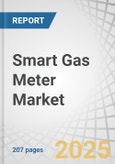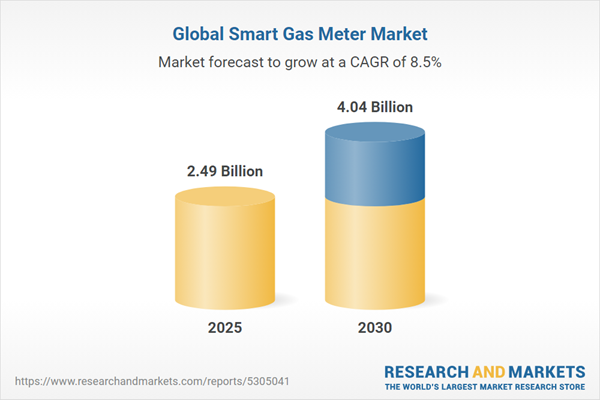As more smart devices join the network through the Internet of Things (IoT), the need for strong, secure, and fast communication systems grows - ensuring everything runs smoothly and safely, even as the number of connected devices skyrockets. Supportive government policies and regulations across the world are pushing for the use of smart grid technologies, including smart gas meters. These initiatives aim to promote energy conservation and improve grid reliability. Recently, the US Department of Energy announced USD 2 million in funding for advanced metering and automation projects that aim to modernize energy infrastructure and have highlighted significant investments in this area. These factors, along with rising demand in industry, commerce, and homes, are driving the use of smart gas meters as essential tools for updating gas networks and creating smarter, more resilient energy systems.
By technology, the automated meter reading (AMR) segment is expected to hold a larger share of the smart gas meter market during the forecast period.
Automated meter reading (AMR) is expected to be the standout feature in the smart gas meter market in the coming years. This growth is fueled by the rising demand for affordable smart gas meters, which can automatically collect readings and eliminate the need for manual checks. The Asia Pacific region is likely to command the maximum share of the market, followed closely by Europe. The growth is mainly due to the extensive rollout of smart gas meters in these geographies' residential, commercial, and industrial areas. This resonates with your interest in smart energy technology and grid modernization as a way to improve efficiency and save costs.By component, the hardware segment is expected to be the largest segment during the forecast period.
The hardware segment is the largest in the global smart gas meter market, accounting for more than 50% of total revenue in 2024 and continuing to dominate through the forecast period. This leadership is driven by the rising demand for advanced metering infrastructure that delivers precise measurement and real-time data capabilities. Hardware devices, such as smart meters, sensors, and communication devices, are the foundation of smart gas metering solutions, which facilitate precise consumption measurement and automatic data collection. Constant innovation in hardware technology has enhanced performance and longevity, aligning with smart gas meters becoming increasingly appealing to utility companies and end-users and driving the market's healthy growth.By region, Asia Pacific is anticipated to be the fastest-growing market for smart gas meters during the forecast period.
The smart gas meter market with the quickest rate of growth is Asia Pacific, with Europe coming in second. China, Japan, Malaysia, Australia, Indonesia, Singapore, and the Rest of Asia Pacific are the countries that make up this region. The region's biggest and fastest-growing market is China. Currently, China is at the forefront of new investments in smart grid technologies. Due to the significant changes occurring in the nation's energy sector, China has emerged as the primary user of smart grid technology. Smart grid technologies will become increasingly necessary as a result of the nation's ambitious renewable energy program. China's emphasis on adopting energy efficiency is another factor supporting the need for the smart grid industry, which in turn is driving up demand for smart gas meters.In-depth interviews have been conducted with various key industry participants, subject-matter experts, C-level executives of key market players, and industry consultants, among other experts, to obtain and verify critical qualitative and quantitative information and assess future market prospects. The distribution of primary interviews is as follows:
- By Company Type: Tier 1 - 57%, Tier 2 - 29%, and Tier 3 - 14%
- By Designation: C-Level - 35%, Managers - 20%, and Others - 45%
- By Region: North Americas - 20%, Europe - 15%, Asia Pacific - 30%, and the Middle East & Africa - 25% and South America - 10%
Apator S.A. (Poland), Diehl Stiftung & Co. KG (Germany), Honeywell International Inc. (United States), Itron Inc. (US), Landis+Gyr (Switzerland), Sensus (Xylem) (US), EDMI Limited (Singapore), Chongqing Shancheng Gas Equipment Co., Ltd. (China), Dongfa (Group) (China), Raychem RPG (India), CHINT Group (China), ZENNER International GmbH & Co. KG (Germany), Master Meter (US), Aclara Technologies (US) are some of the key players in the smart gas meter market. The study includes an in-depth competitive analysis of these key players in the smart gas meter market, with their company profiles, recent developments, and key market strategies.
Research Coverage:
The report defines, describes, and forecasts the smart gas meter market by type (Smart Ultrasonic Gas Meter, Smart Diaphragm Gas Meter), technology (Automatic Meter Reading (AMR), Advanced Metering Infrastructure (AMI)), component (Hardware, Software), end user (Residential, Commercial, Industrial), and by region (North America, Europe, Asia Pacific, Middle East & Africa, and South America). The scope of the report covers detailed information regarding the major factors, such as drivers, restraints, challenges, and opportunities, influencing the growth of the smart gas meter market. A detailed analysis of the key industry players has been done to provide insights into their business overview, solutions, and services; key strategies; Contracts, partnerships, agreements, mergers and acquisitions; and recent developments associated with the smart gas meter market.Key Benefits of Buying the Report
- Analysis of key drivers (Modernizing Gas Networks technologies and asset management of advanced metering infrastructure (AMI)), restraints (Concerns pertaining to data privacy & security and consumer health, high upfront cost), opportunities (Growing emphasis on smart grid initiatives and modernization of gas networks, Integration of artificial intelligence (AI) into smart gas meter operations) and challenges (Delayed realization of return on investment (ROI) due to complexity in integration of devices) influences the growth of the smart gas meter market.
- Product Development/ Innovation: New technology is redefining the market for smart gas meters and will eventually be designed to use superior digital tools enabled by automation, reliability, and economic viability. AI predictive maintenance systems and big data analytics, for example, will monitor large streams of sensor data to attempt to predict failures, which will allow condition-based interventions to avert costly downtime and preserve the life of the meter.
- Market Development: In April 2025, Landis+Gyr and Centrica Smart Meter Assets (a subsidiary of Centrica plc, which includes British Gas) signed a new three-year agreement to supply smart electricity and gas meters. This extends a collaboration that has spanned more than a decade. The partnership aims to further advance the UK's smart energy transition, ensuring households and businesses benefit from improved energy management.
- Market Diversification: In September 2024, Honeywell announced the completion of its acquisition of Air Products' liquefied natural gas (LNG) process technology and equipment business for USD 1.81. This further expands the comprehensive suite of top-tier solutions Honeywell offers its customers to manage their energy transformation journey.
- Competitive Assessment: In-depth assessment of market shares, growth strategies, and service offerings of leading players like Apator S.A. (Poland), Diehl Stiftung & Co. KG (Germany), Honeywell International Inc. (United States), Itron Inc. (United States), Landis+Gyr (Switzerland), Sensus (Xylem) (United States), EDMI Limited (Singapore), Chongqing Shancheng Gas Equipment Co., Ltd. (China), Dongfa (Group) (China), Raychem RPG (India), CHINT Group (China), ZENNER International GmbH & Co. KG (Germany), Master Meter (United States), Aclara Technologies (United States) among others in the smart gas meter market.
Table of Contents
Companies Mentioned
- Apator S.A.
- Diehl Stiftung & Co. Kg
- Honeywell International Inc.
- Itron Inc.
- Landis+Gyr
- Sensus (Xylem)
- Edmi Limited
- Chongqing Shancheng Gas Equipment Co. Ltd
- Dongfa (Group)
- Raychem Rpg Private Limited
- Chint Group
- Zenner International GmbH & Co. Kg
- Master Meter Inc.
- Aclara Technologies
- Wasion Holdings International
- Aichitokeidenki Corporation
- Pietro Fiorentini S.P.A.
- Secure Meters Ltd.
- Fujitsu
- Sagemcom
- Adya Smart Metering
- Ultan Technologies
- Powercom
- Discovergy GmbH
- Sns Technosys
Table Information
| Report Attribute | Details |
|---|---|
| No. of Pages | 207 |
| Published | July 2025 |
| Forecast Period | 2025 - 2030 |
| Estimated Market Value in 2025 | 2.49 Billion |
| Forecasted Market Value by 2030 | 4.04 Billion |
| Compound Annual Growth Rate | 8.5% |
| Regions Covered | Global |
| No. of Companies Mentioned | 25 |









